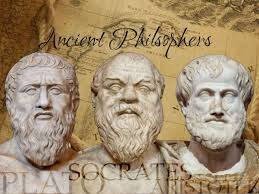If I asked you the question “What is your worldview?” how would you respond? You might be able to shoot me an answer right away, or maybe you need to think about it before responding. Or you might ask me to elaborate. So I’d ask, “What thoughts have shaped your view of the world?” And then I might ask who shaped your thoughts? Which philosopher, teacher, politician, social media personality, or Hollywood star?
Are you and original thinker?
Most people believe their opinions are their own, but that’s seldom true. How many of us, really, have original thoughts? Most of the time our beliefs are molded over years of listening to other people, and then shaping them as we live our lives and allow others to influence us. If you have doubts, ask someone why they believe what they believe, and you often get a blank look, a pause, stutter, and an “I don’t know.”
What do you believe and why do you believe it?
It all comes down to where you get your information.
A Philosophy Timeline
Throughout the ages, men have emerged to influence people’s thinking and way of life. For a variety of reasons—good writing and speaking skills being two of them—these people have risen to the top of the sea of mankind, to speak boldly, affect men’s opinions of the world state of affairs, and perhaps change history by gaining a small following that sometimes manipulates or coerces others into believing what they believe. Pretty soon mob mentality reigns, and you have a social revolt that ends up changing the political landscape in a country or hemisphere.
Today we’re going to get an overview of some of the most well known philosophies in human history. Why is all of that important? Because every writer and teacher approach their subject with some type of worldview, or a casserole of worldviews. And it’s in the reader’s best interest to be able to identify what that worldview is and how it could affect, or manipulate theirs.
In the beginning…
Deism—It seems clear from ancient writings that most, if not all, civilizations, practiced some kind of religion with the foundational believe that there was a god, or some spirit(s) that controlled the universe or at least influenced it to some degree. It has only been fairly recent that atheism has crept into the philosophy list and is practiced with such devotion that many now call it a religion.
Classicism—Then the Greeks came along and turned philosophy into an art form and verbal sport. They became masters of deep thought and debate. Their cogent, articulated beliefs and government structure continue to influence western society and politics. As a philosophy, though, true Classicism seemed to have run its course by A.D. 500, when
Christian Theism—This worldview had overtaken the Greek and Roman world and spread like wildfire across Europe. For better and sometimes worse, (because of the way he did it), the emperor Constantine had a lot to do with that.
Middle Ages—(which were not as “dark” as some would like us to believe) This period roughly spanned A.D. 500 – 1600. The primary belief centered around Christian Theism, which suffered its own ugly and embarrassing gyrations, until European Romanticism arrived on the scene.
Renaissance—1600 – 1865. This is the period when art and exploration and human movement exploded. It’s also the period of time when the Age of Enlightenment emerges. Although Christian Theism and Deism are still big players in world thought, they start seeing increasing competition from Transcendentalism, also known as American Romanticism.
Our Present Age of Hodge Podge: 1865 – Present. Since 1865 we’ve experienced an increase of offerings on the worldview smorgasbord. These entrees include Naturalism, Realism, Absurdism and a revival in Theism.
Worldview Confusion
With all of these philosophies battling for our attention, it’s easy to see why we get so confused and unhinged about our worldview—the beliefs we hold dear and deep in our hearts and souls.
These philosophies have seeped into our politics, journalism, and entertainment. They’ve been given catchy names to lead us to believe they’ve got the right idea about how we should live life, and it’s our responsibility to sniff them out, dissect them, and then keep what is right and good, and trash the rest.
Because you are a product of what you read, who and what you listen to, what you watch, and where you live, where you get your information matters.
We all need to be selective. Your life and time are the most priceless commodities God has given you. Who will you allow to shape your life and take your time?

And how would you answer the question: Why do you believe what you believe?
Coming up!
Next week, which is part two of our worldview foundation building, we’ll start looking at 15 movers and shakers in world philosophy.
For your week:
You might want to have some fun this week by asking other people these questions:
What’s your worldview?
Why do you believe what you believe?
Who has had the greatest influence in your life, and why?
In fact, please drop a comment in the comment box to let me know who your greatest influencer has been and why. And it doesn’t have to be Jesus.
Until next time!
Blessings,
Andrea
May you prosper in all things and be in health, just as your soul prospers (3 John 2).
Photos care of Google Images
